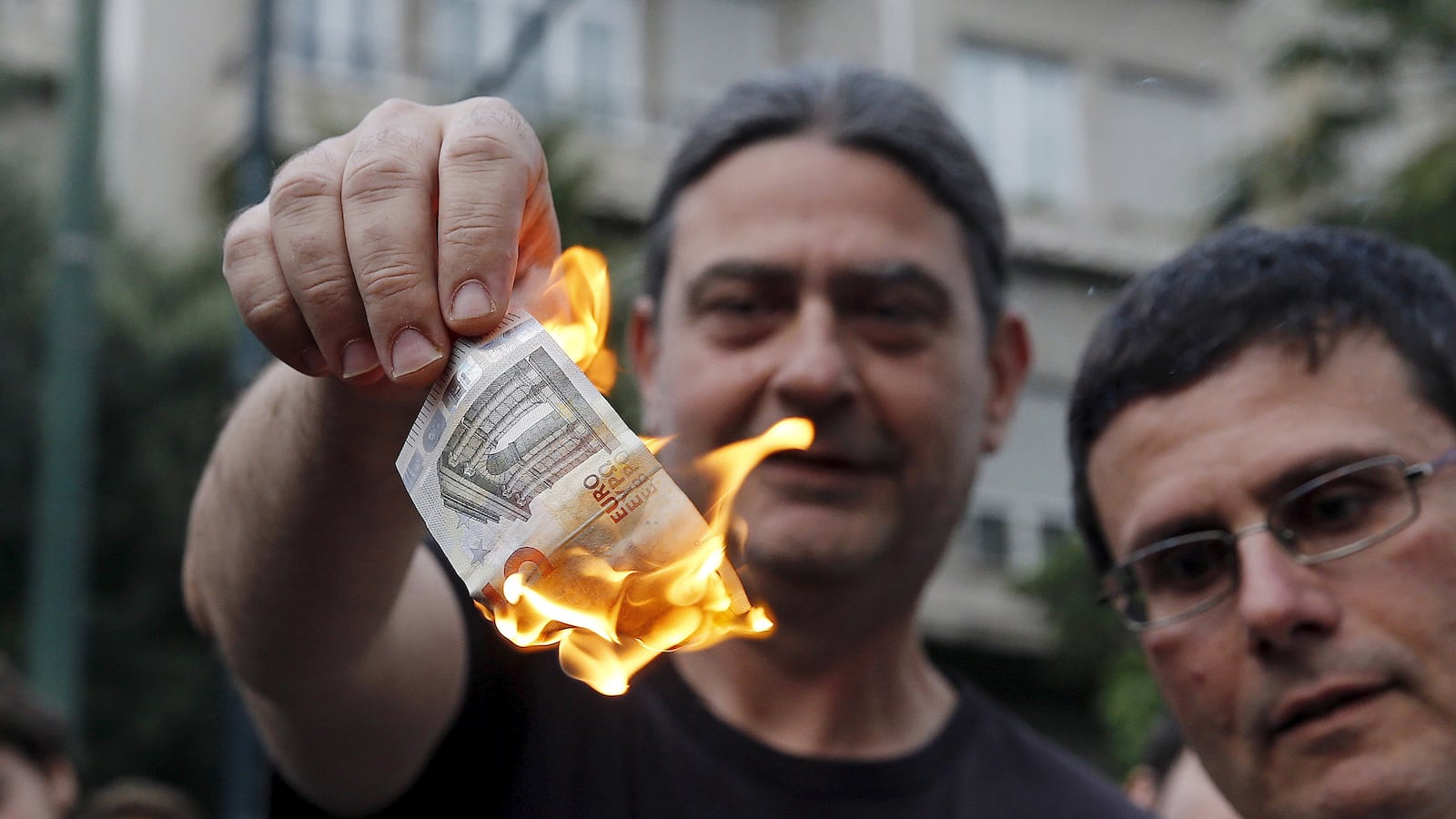A common and colorful way to describe corruption in modern Greek is to say that a particular politician “eats” a lot. This kind of gluttony has nothing to do with baklava or anything else edible; it denotes an appetite sated by the illegal devouring of public funds. When the portly deputy prime minister of Greece was asked in 2010 how the politicians ate the money, a truncated version of his answer quickly became famous: “We ate it all together.” The feasting was not limited to a few plump leaders, he implied; it was a banquet that fed the entire country.
This anecdote might seem like a product of German engineering designed to show the corrupt nature of the perilously indebted Greek state. As the primary creditors of the reluctant-to-repay Greeks, the Germans tend to love any evidence of an essential laziness in the Greek national character. One German politician distilled a common attitude when he publicly remarked that it takes 3,000 Greeks to do the work of 1,000 Germans.
But the fat deputy prime minister’s comment about shared national feasting is not a German invention; it’s one of many similar stories in a penetrating new book by James Angelos, a second-generation Greek-American and former Wall Street Journal reporter. In The Full Catastrophe: Travels among the New Greek Ruins, Angelos uncovers so many examples of Greeks “eating” public money that the expression nearly loses its metaphorical flavor. It’s just what people do to survive: a necessary function of the Greek body politic.
A 2014 analysis by the European Commission found that annual uncollected consumption taxes in Greece totaled €10 billion. Another study estimated that self-employed Greek workers failed to report €28 billion of taxable income in 2009 alone. But these deceptions are relatively uninspired compared to certain schemes. On the island of the Zakynthos, for instance, almost 500 people with perfectly good vision received a blindness benefit from the Greek health ministry for years. When Angelos visits to investigate, his cabdriver complains about the rampant corruption on the island, then cheats him on the fare.
Pretending to be blind is only one of many strategies. At one point 8,500 Greek pensioners claimed to be over 100 years old. In fact, the government was paying retirement checks to dead people whose family members were cashing them. Then there was scandal of the swimming pools, an episode which received international attention around the time of the first Greek bailout. As part of the austerity measures, the Greek government began trying to do in reality what previously happened only in theory: collect taxes from its wealthy citizens. An aerial search by the Greek government revealed almost 17,000 pools in rich neighborhoods that were never declared on tax forms. Sales of camouflage tarps to cover the pools spiked. Many doctors and lawyers, meanwhile, were still reporting incomes as implausibly low as €12,000 a year.
All of this suggests an image of Greece that contrasts starkly with reports of breadlines in the streets, children fainting from hunger at school, and a cloud of smoke from wood fires hovering over Athens in the winter because so many families can’t afford to pay heating bills. Depending on which news sources you read, the Greeks are wealthy, slothful, and good at hiding their money, or they are the victims of punitive German-imposed austerity measures that force the middle class to work 18-hour days just to afford food.
One of the many strengths of Angelos’s book is that he recognizes these alternatives as a false dilemma. Both are true. He quotes a Greek hotel owner who diagnoses the causes of the economic crisis in two succinct sentences: “First, Greece has the problem of itself. Second, Greece has the problem of the Troika.” The Troika, which consists of the European Commission, the International Monetary Fund, and the European Central Bank, has dictated unfairly harsh bailout terms based on misguided predictions about the Greek economy. But a national habit of “eating” public money has not helped the situation.

Here, too, however, Angelos suggests that the origins of this habit are more subtle and complex than most realize. One Greek man traces the impulse not to pay taxes back to centuries of Greek domination by the Ottoman Empire. “The one who didn’t pay taxes to the sultan was smart,” the man tells Angelos. Memories of proud resistance to foreign occupation are still powerful sources of pride for many Greeks.
This helps explain why the rhetoric of resistance and occupation tends to frame contemporary economic issues. The Greeks call an unpopular property tax imposed during the austerity measures the haratsi, a reference to a tax imposed by the Ottomans. The more recent occupiers, of course, were the Nazis during World War II. Hence the popularity of graffiti and cartoons depicting Angela Merkel with a Hitler mustache. One talk radio program even spliced in audio of German crowds shouting Sieg Heil during speeches by contemporary German politicians who support austerity measures.
This sort of provocative tastelessness is what makes talk radio thrive, but it also reflects the depths of bitter suffering that Greeks experienced during World War II. Approximately 300,000 Greeks starved to death during the German occupation, and many atrocities committed by the Nazis were indelibly imprinted in the national consciousness. Greek politicians today who present the austerity measures as a form of economic occupation by German overlords may be appropriating history for dubious ends, but they are also voicing a genuine national anguish over events within living memory.
Angelos is a superb guide to the cultural history of modern Greece, and his analysis gives a nuanced background to the screaming headlines that keep Greece in the news. It’s impossible to understand contemporary Greece without exploring the long shadows cast by the grandeur of its ancient civilization. He quotes a common quip that puts a comic spin on the dilemma: “We gave light to the world and held onto the darkness.” When he goes to visit the Ministry of Health in Athens, he passes a bust of Hippocrates in the lobby. It’s one of many reminders of the glories of Greek antiquity, but perhaps the money could’ve been better spent: in the bathroom there is no toilet paper, hand soap, or paper towels.






